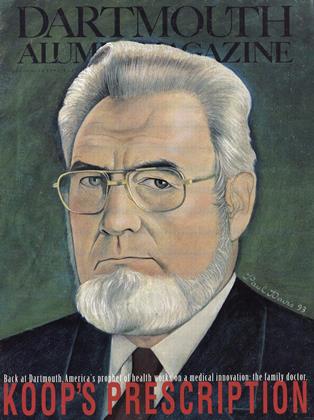Alumni clubs aren't what they used to be. Schmoozing ("networking" in nineties argot) is no longer the main focus, according to club officers. Instead of monthly downtown luncheons, an increasing proportion of the 105 Dartmouth clubs in the United States and overseas are serving other purposes humanity, for instance. Venues are changing from restaurants to food-distribution centers and homeless shelters. Programs are shifting from football chalk talks to seminars on gender and language.
"The clubs have to keep up with changing lifestyles," says Dave Orr '57, senior associate director of Alumni Affairs. "Alumni have to think what they're getting out of their club dues is worth the money." Currently some 15 percent of Dartmouth's 47,000 graduates pay dues to clubs. What they get in return has changed remarkably over the past five years:
Gatherings have become decidedly more intellectual in character. Seventeen club "seminars" are scheduled for this academic year, up from 12 last year. Dartmouth faculty teach mini-courses as diverse as health care (taught at the Long Island Club by C. Everett Koop '37) and Islamic religion and art (Visiting Assistant Professor of Art Marlene Heck and Associate Professor of Religion Kevin Reinhart). The seminars last from half a day to two days.
Last year Boston alumni combined education with professional boostering when they took over the Quincy Market for a "Builders of die Green" program. The event, which showcased the work of 50 architects who graduated from Dartmouth, drew 300 people. Centerpiece of the program was a display of architectural drawings and models that went on exhibit in the Hopkins Center last June.
Increasing numbers of clubs are reaching out into the community. The Greater Boston Club has "adopted" six schools, sending volunteer alumni as tutors and mentors of students. The Chicago and Minnesota clubs have each adopted a school. The club in Washington, D.C., is working through Dennis Goodman '6O to sponsor basketball programs in area high schools. The clubs in Rhode Island and Los Angeles hold regular meetings in homeless shelters. San Francisco alumni help with the city's Toys for Tots program. "These are not the usual things you saw clubs doing five years ago," notes Orr. He says the impetus for the programs comes from alumni of the eighties and nineties who ,as undergraduates had volunteered through the Tucker Foundation.
Eighty clubs gave out 900 books to promising 11th graders last year, up from 16 clubs (and fewer than 50 books) during the eighties. The books—Robert Frost collections, dictionaries, or books with special regional interest—reward good scholarship and, as Orr puts it, "give Dartmouth a recruiting foot in the door with the high school."
Besides service to others, more clubs are providing specific services to members. Dartmouth's Career Services held a jobs seminar in Chicago last year; a similar event is expected this year.
The clubs have not wholly abandoned their traditional sports events and grand dinners. President Freedman is continuing his annual round of clubs: Baltimore last month, Cleveland this month, Dallas and Houston in March, Portland (Oregon), Seattle, and Boston in April.
But some of the sports events have a twist. Last September the four Ohio Valley clubs bought a block of tickets for an NFL game between Indianapolis and Cincinnati. The host: Cincinnati coach Dave Shula '81, who talked with the alumni after the game. This spring the Greater Boston Club is hosting the third Wearers of the Green event, a program that honors Dartmouth athletes. Similar events were held in 1984 and 1989. Expected attendance: 600.
The main reason for the change, according to Orr, is the coming of age of the post-Vietnam generation, who tend to work away from downtown offices and who demand something more than cameraderie for their dues. That's not to say that the monthly luncheons have been abandoned entirely. "There are fewer than there used to be, but still plenty of them," he says.
Schedules of club meetings and seminars are available from Dartmouth's Alumni Affairs office.
 View Full Issue
View Full Issue
More From This Issue
-
 Cover Story
Cover StoryCan the Family Doctor Recover?
November 1993 By Charles Wheelan ’88 -
 Feature
FeatureTHE OLD MEN AND KC
November 1993 By Brooks Clark '78 -
 Feature
FeatureProphet of Limits
November 1993 By Suzanne Spencer '93 -
 Feature
FeatureChew Gum, See Dartmouth
November 1993 By Andrew Edison '91 -
 Article
ArticleDivers Notes & Observations
November 1993 By "E. Wheelock" -
 Class Notes
Class Notes1975
November 1993 By William Blake, W. Blake Winchell
Jay Heinrichs
-
 Cover Story
Cover StoryShould The College Change Its Tune?
APRIL • 1987 By Jay Heinrichs -
 Article
ArticleStatement of Ownership
NOVEMBER • 1987 By JAY HEINRICHS -
 Cover Story
Cover StoryCAN WE TALK?
MAY 1989 By Jay Heinrichs -
 Article
ArticleA Book for Lovers of the Raucous Side of Dartmouth
May 1994 By Jay Heinrichs -
 Cover Story
Cover StoryA Night Out on the Net
December 1994 By Jay Heinrichs -
 Article
ArticleNels Comes Home
April 1995 By Jay Heinrichs








